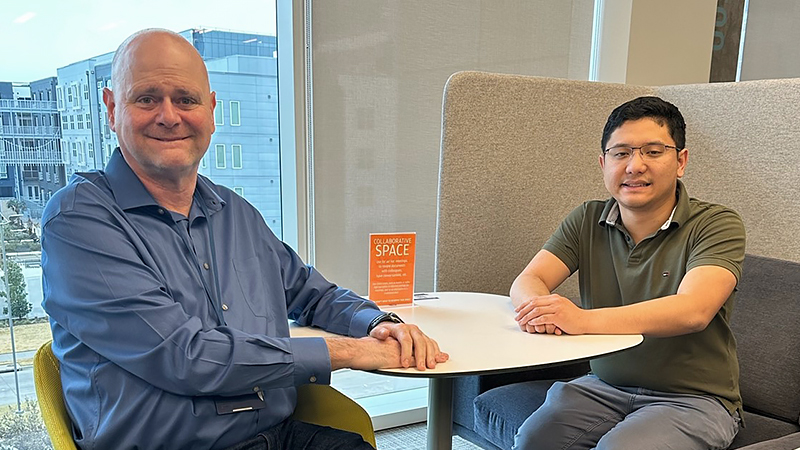Please update your browser.

Stories
Helping Overlooked Workers Become Part of a Team
The Business Solutions Team (BeST) helps JPMorgan Chase employees find the right person for the right job.
Like many young people entering the workforce, Joshua Yap hoped to find a job that fit his talents and interests. But having been diagnosed with Asperger’s as a youngster—and not having much previous work experience—he had little confidence he would be able to find a position that would give him a chance.
Yap also doubted that a company would support him and help him grow because of his disability.
That, however, is exactly what he found during his first year working at JPMorgan Chase as a Transaction Specialist on the Business Solutions Team (BeST). This business initiative matches the talents of people with intellectual and developmental disabilities with the right tasks—in essence, creating the right fit for each employee.
With the help of a Texas Workforce Commission program for people with disabilities and a nonprofit called My Possibilities, Yap qualified for a BeST apprenticeship. At first, he had to drive two hours from home to work each week, but once it became clear that his skills and interests were a fit for the role, he was offered a permanent job, and moved from Wichita Falls, Texas to Dallas-Fort Worth so he could be closer to his office. For the first time in his 30 years, he was able to live on his own.
“This job has given me the experience of what it feels like to be part of a workforce, to feel productive, and it’s really great,” Yap says, noting that some of his co-workers have disabilities similar to his.
With a manager who is very helpful and presents information in a systematic way, Yap now has the confidence that JPMorgan Chase is invested in his success. Employed through JPMorgan Chase’s Commercial Banking division—and aligned to the BeST program through the Office of Disability Inclusion—he works with colleagues and managers who recognize the value of creating and championing a neurodiverse workforce.
Starting as an Apprentice
The BeST program includes a 60-day paid apprenticeship, with ongoing support for employees, teams and managers. Launched in 2019 with a handful of apprentices, the program currently has dozens of active apprentices and employees. The goal? To reach 100 employees by 2025 and expand into five additional markets within five years. The program currently works in the Dallas-Fort Worth area, as well as in Chicago, Ill., Columbus, OH and Monroe, LA.
BeST employees work with internal and external job coaches, as well as their managers. Their leaders and peers take part in a virtual or in-person disability etiquette and awareness training to develop the insights and skills they may need to help their employees and colleagues perform and be successful.
“We provide this training to bring awareness to everyone that we are all different: We think, communicate and process information differently,” explains Danielle Meadows, who heads BeST.
Two years ago, when Glennetta Porterfield started her job as a Receivables Operations manager in Dallas-Fort Worth, one person on her team was already from BeST. Now, she’s supervised three BeST employees and seen their personal growth, as well as the value they bring to the company.
“The role they play is crucial,” she says. “We often talk about how they support us; we wouldn’t be able to meet our clients’ expectations without them. When we set meaningful and attainable goals in our coaching sessions and they flourish—that’s one of the most rewarding experiences to me.”
Driving Efficiencies
BeST brings inherent value to the business: By taking on some of the more routine tasks, these colleagues are helping their respective business groups become more efficient and satisfied with their own jobs.
“There are challenges,” Porterfield admits. “Initially there can be some apprehension when engaging with others on the team, as well as setting goals that allow them to maximize their potential. We work on that at their own pace, which gives each person an opportunity to succeed in their job.”
As JPMorgan Chase’s first neurodiversity job coach, Cody Lunde works across the company to support BeST employees. He sees, firsthand, how learning new skills and having the security of a job impacts the lives of these employees—giving them purpose and independence, as well as health insurance and increased financial security. He also points out how those benefits extend to their colleagues as well.
“Through their individuality, they help increase a sense of awareness about neurodiversity for everyone on site,” Lunde says, describing how the right person in the right job can also address challenges that can come with iterative work. “When we step outside of our usual ways of interacting, it forces people to slow down and appreciate the human connections we can make at work.”
External Partners
Some candidates find jobs at JPMorgan Chase through universities or local organizations, such as the national nonprofit Bridges From School to Work, which connects employers with potential employees and helps to manage their transition from apprenticeship to permanent employment.
Through Bridges, Chase hired Daniel Cannon to sort and dispose of returned mail with credit cards. Robert Mollard, Director of the Dallas-Fort Worth Bridges group, worked side-by-side with Cannon for the first couple of days, then stayed in touch as a job coach before moving into the background. He continued to check in with both employer and employee during the first year to make sure it was a good fit.
“The job is perfect for Daniel because he thrives on repetition,” Mollard says. “It has to make good business sense. It’s all about finding out what the employer needs and who has the skills and abilities.”
Another nonprofit, My Possibilities, helped Bernie Fisch find and transition into a new job after losing the accounts payable position he held for nine years; he lost his job when the publicly traded loyalty and marketing services company where he worked sold the division he supported. At 52, Fisch lives at home with his mother, Linda Fisch, who is as proud of Chase as she is of her son.
Today, Fisch works a hybrid schedule—two days a week at the JPMorgan Chase office in Plano, TX and three days from home. While the company thought the job would take over a year, Fisch completed it—error free—in just six months. Linda Fisch has seen her son’s ability to communicate and build relationships develop as he interacts with his growing team through Zoom and in the office.
“It gives Bernie a purpose; he loves doing his tasks completely and thoroughly,” she says. “Bringing people with various challenges into the workforce is better for them, for the company, for the community and for the economy.”
For more information about Best, send an email to business.solutions.team@jpmchase.com.
